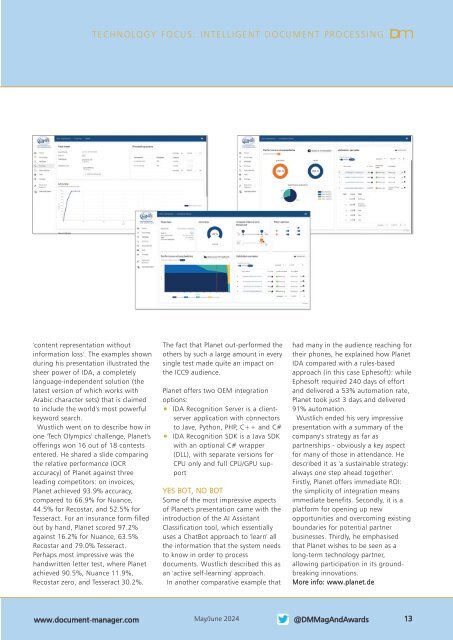DMLATEST
You also want an ePaper? Increase the reach of your titles
YUMPU automatically turns print PDFs into web optimized ePapers that Google loves.
STRATEGY: BUSINESS PROCESS MANAGEMENT Dm<br />
and individual team members are less<br />
likely to cause bottlenecks if they are<br />
otherwise engaged. In many routine<br />
cases, processes can be automated<br />
when everything can be reliably<br />
brought together in the right context<br />
to reach conclusions, complete tasks,<br />
and determine next actions.<br />
HOW ARE BPM AND DIGITAL<br />
TRANSFORMATION CONNECTED?<br />
Business process management plays a<br />
crucial role in enabling and supporting<br />
digital transformation initiatives across<br />
organisations. As companies look to<br />
digitally transform, BPM provides<br />
several key functions:<br />
1. Driving efficiency through process<br />
improvement<br />
One of the main goals of digital<br />
transformation is to increase efficiency,<br />
productivity, and agility across the<br />
organisation. BPM provides the<br />
methodology to analyse current<br />
business processes, identify<br />
inefficiencies, bottlenecks, and<br />
unnecessary tasks, and then redesign<br />
those processes to be streamlined for<br />
the digital age.<br />
With a focus on constant<br />
optimisation, BPM provides the<br />
roadmap for transforming legacy<br />
processes into digital, automated<br />
processes that improve speed, reduce<br />
costs, and enhance quality.<br />
2. Supporting adoption of new<br />
technologies<br />
Digital transformation inherently relies<br />
on the adoption of new technologies<br />
like cloud platforms, AI, and advanced<br />
analytics. BPM helps to ensure effective<br />
integration and change management<br />
as these new technologies are<br />
embedded into business processes by<br />
design. BPM provides visibility into<br />
end-to-end processes to help identify<br />
the best areas and use cases to<br />
leverage new technologies for<br />
maximum impact on the business.<br />
3. Enabling greater collaboration<br />
across functions<br />
Digital transformation breaks down<br />
traditional company silos, encouraging<br />
greater collaboration and connectivity<br />
across teams, functions, and locations.<br />
BPM provides documentation of<br />
people, systems, data, and steps in<br />
processes that gives greater visibility<br />
across the organisation. This supports<br />
cross-functional collaboration and<br />
alignment that is critical for success.<br />
4. Driving a customer-centric culture<br />
A major goal of digital transformation<br />
is using technology to provide seamless<br />
and personalised customer experiences<br />
across channels. BPM initiatives embed<br />
the customer into process design,<br />
mapping different customer journeys<br />
to identify pain points and areas for<br />
digitisation. This contributes to the<br />
cultural shift with the customer at the<br />
core rather than internal goals.<br />
Without robust and mature Business<br />
Process Management, companies will<br />
struggle to successfully implement<br />
digital transformation initiatives.<br />
Attempting large-scale technology and<br />
process changes without a detailed<br />
understanding of current workflows,<br />
metrics, and bottlenecks creates<br />
misguided transformation efforts,<br />
insufficient governance, lack of<br />
standardisation, and poor adoption of<br />
new tools across the organisation.<br />
By jumping straight into a digital<br />
overhaul without proper process<br />
documentation, analysis, and redesign,<br />
organisations implement one-off<br />
systems that increase complexity rather<br />
than unlock efficiency gains. In the<br />
end, overlooking BPM before<br />
undergoing transformations leads to<br />
disjointed operations that fail to meet<br />
targets and never achieve the level of<br />
digital integration required to excel in<br />
today's regulated business landscape.<br />
BENEFITS OF BPM SOFTWARE FOR<br />
DIGITAL TRANSFORMATION<br />
Now that we've looked at how Business<br />
Process Management and digital<br />
transformation are connected, the next<br />
step is to discover how to implement<br />
BPM to bolster the digital<br />
www.document-manager.com<br />
March/April 2024<br />
@DMMagAndAwards<br />
13

















